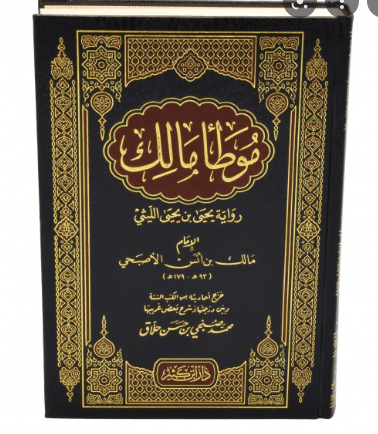The Muwatta Of Imām Mālik, Its Importance, Acceptance And A Lesson For The Ulamā And Tullāb.
Ibn Abdir-Rahman Al-Atharī (Al-Maymūnī)

The name Muwatta is not a strange name in any of the madāris and circles of knowledge in the world today and this is not because the generality of the muslims are adherents of this madhab but because it has stood the test of time and it’s uniqueness and quality cannot be overlooked.
The book was written by the Imām Mālik Ibn Anas Ibn Mālik Ibn Abī ‘Āmir Ibn Amr Al-Madanī rahimahullāh popularly known as Imām Mālik from among the Imāms of the legal schools of thought in fiqh.
His madhab (Māliki madhab) is one of the widely accepted madhab today that have dominance in places like Andalusia (modern day areas in spain and portugal), North Africa and West Africa which includes Nigeria and you will find adherents of the madhab in many places around the world. This work of the Imām contains over one thousand five hundred narration which he gathered from atleast a thousand narration and it is one of the oldest collection of ahādith that detailed the topics of fiqh in it making it a book that is mentioned and referred to in both science (hadīth and fiqh).
Several of the ulamā past and present showered praises for this work and one of the popular statement about this work is that of the polymath Imām Muḥammad Ibn Idrīs Ash-Shāfi’ī rahimahullāh who regarded this work as the most authentic book on earth after the Qur’ān as mentioned by Ibn Abdil Barr in his book At-Tamhīd. However, it should be noted that the scholars are of the position that the Sahīh of Imām Bukhārī and Muslim holds this position and Imām Ibn Kathīr clarified this in his book Ikhtisār Ulūmil Hadīth that Imām Ash-Shāfi’ī made this statement before the compilation of the sahīhayn.
Imām Mālik is reported to have said as mentioned by Imām As-Suyūtī in Tanwīr Al-Hawālik:
عرضت كتابي هذا على سبعين فقيها من فقهاء المدينة ، فكلهم واطَأَنِي عليه ، فسميته الموطأ
I showed this book of mine to seventy of the jurist of Madīnah, and all of them agreed with me on it, so I called it Al-Muwatta.
The Imām had many students who studied and took the Muwatta from him and these students transmitted it to others but today we have very few of them that survived. From among the surviving version is that of Muhammad Ibn Hasan Ash-Shaybānī, Yahya Ibn Yahya Al-Laythī, Az-Zuhrī which are well known and others like the version of Ibn Wahb, Al-Qa’nabī, Suwayd Hadathanī, Alī Ibn Ziyād, Ibn Al-Qāsim.
The version of Muhammad Ibn Hasan Ash-Shaybānī is known to be popular with the people of Kūfa (Iraq)and more in line with their fiqh, the Laythī version is more popular, generally accepted and what is meant whenever Muwatta is mentioned and some say it is the standard version of the Muwatta worldwide and that is probably what you have at home (you can check), finally the version of Az-Zuhrī is said to be the more revised and more complete as he spent longer time with Imām Mālik, said to be the last to transmit it from him and this is known because Imām Mālik spent more than 30 years revising the Muwatta. It should be noted that the Az-Zuhrī mentioned here is the Imām Abū Mus’ab Ahmad Az-Zuhrī who was a student of Imām Mālik and not Muhammad Ibn Muslim Ibn Shihāb Az-Zuhrī who was a teacher of Imām Mālik and we ask Allāh to have mercy on them all (Āmīn).
Due to this work known among the classics, so many people have made efforts to explain it and teach the muslims and this includes scholars from other schools of thought aside the mālikis .
From among them we have
– Sharh Mushkilat Muwatta and Awjāzul Masālik of Mulla Alī Qārī and Kandahlawī respectively who were both Hanafi Imāms.
– Imām Shah Waliyullāh Muhadith Ad-Dehlawī also wrote two explanations on Muwatta, one in arabic (Al-Musawwa Sharh Muwatta) and the other in persia (Al-Musaffa Sharh Muwatta).
– Al-Imla Fī Sharh Muwatta by the Dhāhirī Imām Ibn Hazm Al-Andalūsī rahimahullāh as mentioned by Imām Adh-Dhahabī.
– Tanwīr Al-Hawālik Sharh Muwatta Imām Mālik of Hāfidh As-Suyūtī and he was from the shāfi’ī madhab.
And it is noteworthy to mention that some scholars of the Hanbalī madhab in our time also have explained this book in their sittings.
The Māliki Imāms have explained this book in great detail from the east to the west and you will always find a circle of the scholars and students of knowledge where this book is being mentioned or referred to.
Some of the popular shurūh of this text is the sharh of Imām Muḥammad Az-zurqānī, Al-Muntaqa of the Imām Abūl Wālid Al-Bājī and the works on Muwatta by the Imām Abū Umar An-Namari Yūsuf Ibn Abdillāh Ibn Muhammad Ibn Abdil Barr Al-Andalūsī Al-Mālikī popularly known as Ibn Abdil Barr the author of two popular explanation of the Muwatta
– Al-Istidhkār Li Madhab `Ulamā’ Al-Amsār Fīmā Tadammanahu Al-Muwatta Min Ma’ānī Ar-Rā’ī Wal Āthār which he explained according to the chapters of the book using the popular version of Al-Laythī
– At-Tamhīd Limā Fīl Muwatta Minal Ma’ānī Wal Asānīd and this he arranged with respect to the teachers of Imām Mālik.
All of what has been mentioned above should be enough for the scholars and students of knowledge to note the importance of this work but why have we mentioned the Muwatta and what was the secret behind the wide acceptance of this book?
While studying the introduction of Māliki fiqh with my teacher and shaykh (May Allāh preserve him) he mentioned a particular story while emphasizing on how serious we should be and how we should strive to attain sincerity in all we do and say. He mentioned that it was reported that they were many Muwatta that was written during the time of Imām Mālik rahimahullāh and when it was said that the Muwatta has become plenty (others have written books with the same name), it was mentioned to Imām Mālik rahimahullāh and he gave a famous response that has penetrated the minds of those who are striving to be truthful in the path of Allāh over the years. The Imām rahimahullāh said
ما كان الله بقي
What is for Allāh remains
Or that he said
ما كان لله يبقى ويدوم وما كان لغيره يذهب ويزول.
What is for Allāh will remain and last and what is for other than him will depart and vanish.
To the muslims, the issue of being sincere to Allāh subhanahu wata’ala has never been a matter that we should take as a light one. Are we followers of our salaf on striving to be sincere or we’ve allowed our desires to get the better part of us.
Our actions and statements may not benefit us if we do not strive to see that sincerity remains a condition for it.The statement of Ibn Abdil Barr in At-Tamhīd after mentioning this incident still rings a bell.
“فذهبت الموطآت كلها وبقي موطأ الإمام مالك”
And all of the Muwatta left and that of Imām Mālik remained.
It is as Allāh subhanahu wata’ala mentioned in the Qur’ān:
فأما الزبد فيذهب جفاءً و أما ما ينفع الناس فيمكث في الأرض…
Then, as for the foam it passes away as scum upon the banks, while that which is for the good of mankind remains in the earth… (Sūrah Ar-Ra’d verse 17)
Our worship that people see, the talk we give, the lectures we deliver, our social media post, our seeking for knowledge and teaching it to others and many more, how many of them is sincerely for the sake of Allāh?
Can’t we see oh brethren what Imām Mālik said and how Allāh subhanahu wata’ala accepted his work?
If you mention the Muwatta today, no one mentions that of others if not that of Mālik.
In it is a lesson for whoever wants to take heed and rectify his or her affairs for as long as we are still breathing then there is always a chance to rectify ourselves and seek Allāh’s assistance.
We need to ask ourselves what will become of us after our stay here on earth and what will we be remembered for?
As much as we complain about the weakness of the ummah and how far we are from our glory days, we should also have it in mind that our sincerity towards this dīn matters alot.
To the scholars and students of knowledge specifically and to the muslims in general, this is a call for us all to turn back to Allāh subhanahu wata’ala in repentance and seeking His forgiveness and mercy for indeed we’ve almost lost it completely.
Oh Allāh, grant us complete sincerity in our words and actions. Purify our hearts, thoughts and make us better. Oh Allāh, use us and do not replace us and grant us the much needed Thabāt, Tawfīq and Sadad on this path.
“ربنا وآتنا ما وعدتنا على رسلك ولا تخزنا يوم القيامة إنك لا تخلف الميعاد”
Our Lord, Grant us what you promised to us through your messengers and disgrace us not on the day of resurrection, for you never break your promise (Sūrah Āl-Imrān verse 194)
© Ibn Abdir-Rahman Al-Atharī (Al-Maymūnī 📚)
18th Dhul Hijjah 1443AH




